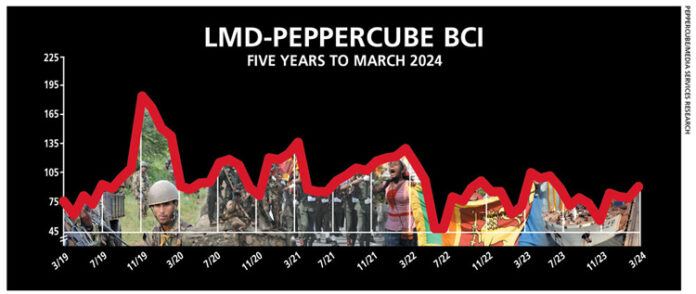By: Staff Writer
April 09, Colombo (LNW): Sri Lanka initiated the second review under the IMF’s Extended Fund Facility (EFF) framework, signifying a crucial step forward in ongoing efforts to foster economic growth – and the authorities remain optimistic about concluding the review successfully and securing a staff-level agreement, which would facilitate accessing the third tranche.
In December, the International Monetary Fund approved the disbursement of US$ 337 million following the initial review of the EFF with a pledge to implement debt restricting agreements with official creditors.
In parallel, President Ranil Wickremesinghe outlined the government’s expectation of securing a debt moratorium from 2023 to 2027 – and resume debt repayments between 2027 and 2042 – with further restructuring anticipated to reduce annual external debt payments to four percent of GDP.
It’s been nine months since the LMD-PEPPERCUBE Business Confidence Index (BCI) surpassed the 90 point mark. In March, the barometer recorded a healthy 12 basis point rise to 93, though it remains substantially below its all-time average of 123.
The March score mirrors that of July last year when the BCI stood at 93.PepperCube Consultants attributes the good news to the business community’s “acclimatisation to the prevailing economic climate post the value added tax (VAT) hike.”
It asserts that corporate optimism over the economy and anticipation of maintaining sales volumes over the next 12 months has fuelled the surge in business confidence, although “inflation and high interest rates – not to mention the business unfriendly tax regime – continue to be key challenges faced by the business community.
” PepperCube also notes the “interest in increasing the workforce in the corporate sector, which has recorded an improvement from January and February.”
The reality however, is that on both the internal and external fronts, sensitivities continue to abound.
Here at home, the cost of doing business continues to be high and the recent tax increases are having a telling effect on businesses.
On the global front, the twin wars in Ukraine and Gaza continue to raise the prospect of even higher import prices (for example, oil) and a hard rather than soft landing for the world economy could be on the cards in the medium term.
Contrary to the assertion in the February edition of LMD, suggesting that “the BCI is unlikely to gain any substantial ground at least until there’s clarity on the timing and conduct of one or more elections this year,” the pendulum has thankfully swung in the right direction.
And as PepperCube notes, “as election fever sweeps the nation, politics and the political culture continue to cause anxiety [in business circles] although they’re overshadowed by economic concerns…”
Accordingly, the trajectory of the index in the next six months or so remains uncertain, given the prospect of political turmoil ahead of elections – as we know, political instability in any shape or form will hurt the economy.

